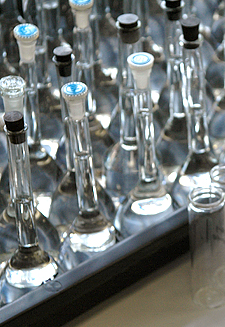M. Sc. Kristin Hausmann

Kristin Hausmann
Tel. ++49 345 55 25188
e-mail: kristin.hausmann(at)gmx.de
Development of novel epigenetic inhibitors for anti-parasitic therapy
Parasites of the genus Schistosoma, Leishmania, Trypanosoma cruzi and Plasmodium cause the tropical diseases schistosomiasis, leishmaniasis, Chagas disease and malaria, which create significant health and economic problems, particularly in underdeveloped regions of the world. As one of the major neglected parasitic diseases, schistosomiasis affects around 250 million people worldwide and leads to at least 300.000 deaths each year. Also known as bilharzia, schistosomiasis is caused by a blood-dwelling fluke of the genus Schistosoma, which uses a fresh water snail as an intermediate host and is transmitted through contaminated water. Within the human host, the parasite passes through several stages in its life-cycle and causes various severe symptoms. A chronic disease usually leads to an immunopathological inflammatory reaction on the eggs of the schistosomes, which are trapped in different body tissues. With the absence of effective vaccines and the excessive use of praziquantel to treat infected individuals and for preventive treatment, the problem of resistant schistosome strains is developing. Many human parasites share several characteristics with malignant tumors, including a strong expression of single epigenetic regulatory proteins. Human epigenetic enzymes, in particular histone deacetylases (HDACs), are predominantly attractive inhibitory targets for anti-cancer therapies.
Knockout studies of single parasitic HDAC´s have shown that different isoforms are essential for various parasites. We are focusing on the isoform smHDAC8 from Schistosoma mansoni and the homologous isoform tcDAC2 from Trypanosoma cruzi. Interestingly, the human counterpart (HDAC8) is only expressed on a low level and there is no known phenotype in knockout studies. The project aims at the structure-based design and the synthesis of novel inhibitors for epigenetically relevant enzymes of these parasites. In collaboration with structural biologists (IGBMC, Strasbourg, France), in vitro assay developers (Univ. Freiburg) and parasitologists (Institute Pasteur Lille, France) and the two companies Kancera SE and Adlego Biomedical, we were able to identify and validate the first parasitic targets for drug discovery. The purpose of our research project is the synthesis of compound libraries using computer-based methods for lead structure optimization. Testing of the compounds is realized on isolated enzymes as well as in phenotypic screenings to determine the toxicity for parasites.
Publications/Poster
T. Bayer, A. Chakrabarti, J. Lancelot, T. B. Shaik, K. Hausmann, J. Melesina, K. Schmidtkunz, M. Marek, F. Erdmann, M. Schmidt, D. Robaa, C. Romier, R. J. Pierce, M. Jung and W. Sippl. Synthesis, crystallization studies and in vitro characterization of novel cinnamic acid derivatives as SmHDAC8 inhibitors for the treatment of Schistosomiasis. Chem. Med. Chem., 15, 1517-1529, 2018. doi:10.1002/cmdc.201800238 .


